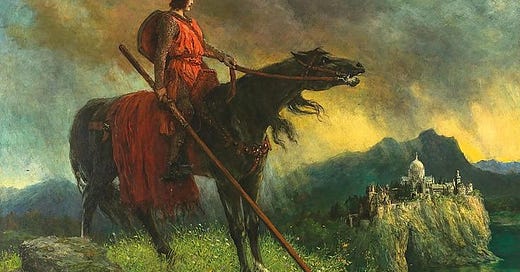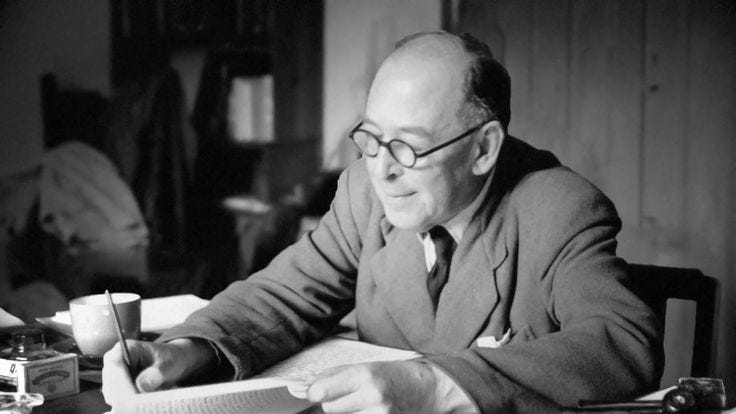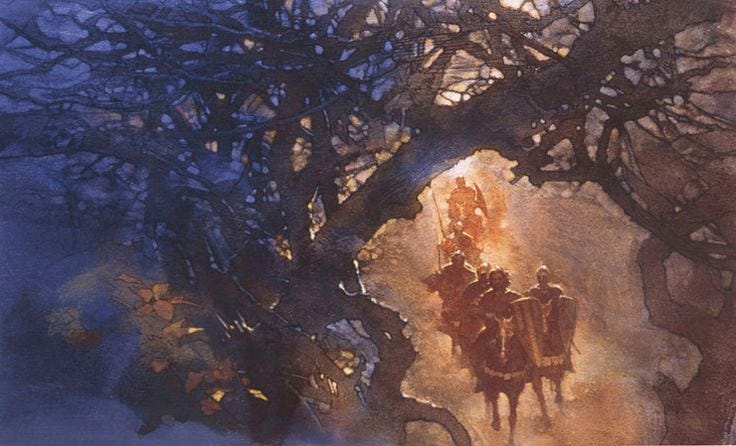"And see not ye that bonny road, That winds about the fernie brae? That is the road to fair Elfland, Where thou and I this night maun gae." - Thomas the Rhymer
I remember being in elementary school, learning the tales of Troy, Beowulf, and King Arthur among countless others. I remember getting lost in video games like The Legend of Zelda for hours. I remember the first time I saw Peter Jackson’s The Lord of the Rings films. I remember poring over these stories over and over again. I remember the feeling these stories gave me, the odd melancholy that came with it, and one day scribbling on a piece of paper during class, “What happened to the age of heroes?”
I do not think I am alone in feeling that something wonderful is missing in the world, and longing for something I do not fully understand. Many others have felt the sense that the world has been “disenchanted”. Our intuition tells us a certain spark that once existed, is long gone. It is uncertain what exactly this means, though we can all feel it in some way. Ours is not the world of our grandfathers, and it certainly does not feel at all like the world we read about in histories and in legend. Ours does not feel like a world where heroes slay dragons, or elves haunt the wood, or where the Son of God becomes man and tramples down death by death. Yet, our hearts tell us these things did in fact happen, that they are real, realer than what we are told is real. Something has clearly gone awry. We long for something far richer than the existence we know as normal. We have an itch for high beauty and adventure and romance that we cannot seem to scratch. We long for enchantment in a disenchanted world.
But when we speak of a disenchanted world, what exactly are we talking about? Do we mean that the cosmos itself has been stripped of its magic? Or do we mean that only our perception, the way we see and think about the world, has changed? Do we mean that it is men who are disenchanted in the midst of a still enchanted world? Do we mean all of these at the same time? If so, how was the world disenchanted? In what ways was the magic stripped from our world? Is disenchantment literal, or is it more of a philosophical and symbolic phenomena? Were past ages were truly different from ours? What if the ancients experienced a different world than we do, not only in the way they saw reality, but a truly different, enchanted world? In any case, regardless of specific opinions we can all agree that something has gone wrong. In some way, the world was disenchanted. So what to do?
There is a growing sphere talking about “re-enchantment”, the idea of trying to regain whatever it is we have lost, in order to enchant mankind and the world once again. We are more and more seeing people return to an older way of viewing the world, people are speaking about magic and symbolism again, returning to religion, and attempting to throw off the shackles of rationalism. J.R.R. Tolkien and C.S. Lewis are sometimes treated as the founding fathers of the movement, and discussions often revolve around their work. Certainly, their thinking has influenced western culture perhaps more than any others. The “re-enchantment movement” is typically characterized by a love of classic literature, an aesthetic marked by pipes and wooden bookshelves and tweed suits, and a bombardment of podcasts, blogs, and essays (which I am now contributing to). But I have found this movement regrettably lacking in its ability to chart a path forward. It often feels like a self-contained ecosystem where the end goal is simply to get more people reading essays about re-enchantment, and perhaps writing their own essays about re-enchantment. Maybe at best, some people start going to church. I have come across very little discussion on what mankind actually needs to do in order to achieve re-enchantment. Like the idea of disenchantment, re-enchantment is a vague concept. What exactly would re-enchantment look like, what does it mean? Is it something that is even possible to construct? Do we actually want to live in a re-enchanted world, or are we more comfortable in a world stripped of magic and mystery?
This essay serves as my brief introduction to a new series where I’ll be attempting to take on all of these questions and more regarding the disenchantment of the world, and what we might do to re-enchant it. I should admit here at the beginning, I don’t have answers to reveal to you. I am not working towards some clever conclusion that I have already planned out. I am just another pilgrim on the Grail Quest. I intend for these essays to be less like a series of lectures, and more of an expedition into the dark forest, an adventure, one with no preplanned route, one I hope you all will take alongside me.
To re-enchantment the world, I believe, will take more than philosophy and impressive prose. Much more. It will take a mixture of courage, whimsy, wonder, laughter, humility, and the shedding of many tears. To delve into myth and magic and the mystery of the cosmos is not for the faint of heart. To re-enchant the world and open the gates of Faerie is no safe task. And therefore, I don’t intend to make these essays overly academic, and I don’t intend to shy away from ideas that may be deemed too “out there”. To safely explore the enchanted realm requires one to be pure of heart, and one must leave pretension and stuffiness at the gate.
While I do not see all the paths that this journey will take us down, I can already glimpse some of them. I’d like to examine the premise that the world, or mankind, is disenchanted in the first place- what does this entail? And what came first, our own disenchantment, or that of the world? I plan to explore the enchantment of the earth through the creation of sacred landscapes, as well as the destruction and disenchantment of those landscapes. I wish to explore the disenchantment of education, of politics, of music, of adventure, of the Church, and much more. I hope to receive suggestions on what to explore and where to look from all of you as well. The curse of disenchantment runs deep, and we may be hard pressed to run out of topics. But all the better- with each strain of the spell we expose we come closer to finding a way to break the curse altogether, and God willing, one day we may see spring again.
As always, my ability to write and edit these essays is made possible by my generous patrons. I don’t write extra articles or run a fan club for them- these patrons are supporting our Grail Quest simply out of the goodness of their hearts. Writing, editing, and pondering over these essays takes hours, days, sometimes even weeks, and so if you’d like to support this effort, you can join the ranks below.







I'm guessing we need, among other things, to sing songs ourselves, however badly, to read great works aloud, however softly, to essay works that were just barely accepted for brief periods of time in the early and middle Middle Ages, often called magic. To use the psalms as cantrips, to fight against evil, to actually do what our religions beg us to do. To appreciate antiquity in all its horror and beauty. All that. More. Seek diligently, as you are doing here...
A lot of the feelings of disenchantment come from being told to ignore those things that we know are real, but can't explain with science.
Focus on these things and the enchantment reappears. Trusting our intuition rather than dismissing it as superstition or fantasy.
This can be done anywhere, it doesn´t even require a natural or beautiful surrounding. Though it is easier to do in such settings. The beautiful old architecture and sacred sites are an attempt to manifest the enchantment into the physical.
By focusing on these mysteries we know are real, we help to break the spell that modernity has cast over our minds. The more it is dispelled, the more confidence we have to fight the evil. The heroes may emerge in this frame.